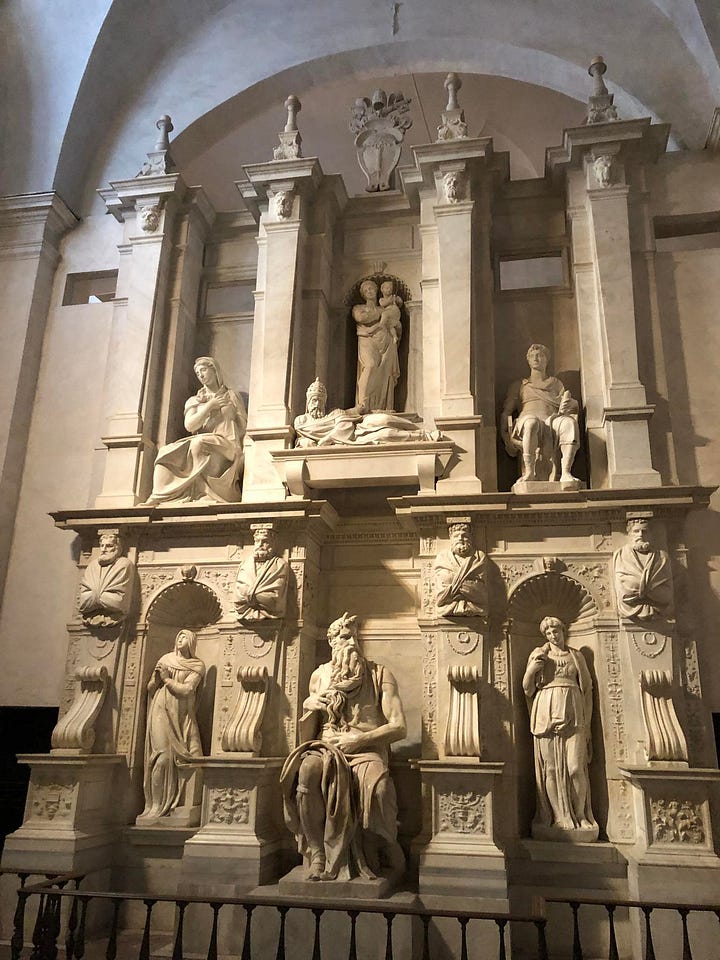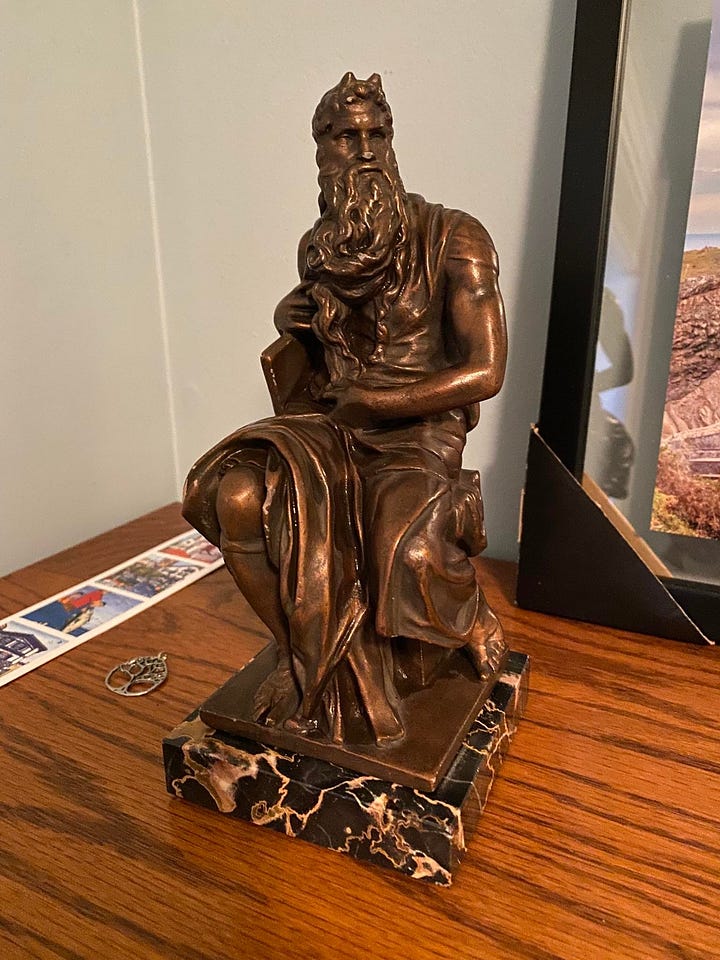☕ saturday mornings - april 15, 2023
magic, belonging & answering to life
Happy Saturday!
I hope you’re having a lovely start to your weekend.
What I’ve been up to:
I'm preparing for my final exams and spending time with friends before we graduate and go our separate ways.
Here's a recap of the most interesting ideas I've explored this week.
Enjoy.
✍️ quote i’m pondering:
Roald Dahl, British author, on the unknown:
"Those who don’t believe in magic will never find it."
A similar idea from one of my favorite poets, Mary Oliver: "Only if there are angels in your head will you ever, possibly, see one."
📚 book passage i loved:
The Rebbe comforted me about life and death.
He made me see that my general, uneducated sense of the world—that there is a God, an order, a plan—was not superstition or error, but correct, built into me for a reason, as my heart or lungs are built into me. Without it, I could not live.
Which is why you need more than material things.
I mean, yes, the material can be nice. I like having what I have, but I know none of it is mine, that we are only renters on earth, that even our bodies belong to someone else. Which is why you hunger even when you’ve had your fill. Life will never satisfy if it is experienced only as the rise and fall of commerce.
You need to see yourself as part of something larger that never dies.
― When I Stop Talking, You'll Know I'm Dead by Jerry Weintraub
💡 essay from me: answering to life
On April 22, 1958, Hunter S. Thompson wrote a letter to his friend, responding to a request for advice.
Dear Hume,
You ask advice: ah, what a very human and very dangerous thing to do! For to give advice to a man who asks what to do with his life implies something very close to egomania. To presume to point a man to the right and ultimate goal— to point with a trembling finger in the RIGHT direction is something only a fool would take upon himself.
... Remember that all advice can only be a product of the man who gives it. What is truth to one may be disaster to another. I do not see life through your eyes, nor you through mine. If I were to attempt to give you specific advice, it would be too much like the blind leading the blind.
In short, most advice sucks.
While Thompson's warning has clear application to traditional life advice, it contains a wider-reaching truth: No one can tell you what the "right thing" to do is.
As I make hundreds of small choices throughout the day, I’m building a life. But, at the same time, I’m closing off the possibility of countless others. Forever.
When you say "yes" to one thing, you're saying "no" to everything else you could have done instead. The original Latin word for “decide,” decidere, means “to cut off.” A decision to do any given thing means cutting off an infinite number of potential alternative paths. Doors close, time marches on, and you can only hope you made the right choice.
Staring into the void of infinite possibility is terrifying. When there are a million things you could do, paths you could take, lives you could live, it's impossibly hard to choose. Let alone choose with any degree of confidence.
The burden of responsibility to choose correctly can feel crushing, like Atlas hunched over, straining under the weight of the world.
The minute someone offers a solution, a clear path forward in our uncertain messy tangled world, we jump at the opportunity to take some of the weight off our shoulders.
I tend to place people on an intellectual pedestal. I see people that seem to have life figured out. Older, smarter, richer than me. In some small space in my mind, I worry they live better than I do. They know secrets about life that I don't. A sense of panicked urgency creeps in that I'm living incorrectly, squandering my potential, choosing the wrong things. I almost feel coerced to absorb as much as possible from what's in their head. To figure out what they know because I need to know too. To let them answer life's questions for me because they know better.
It's easy to think someone else knows what that "right thing" is. But, the truth is, no one has it all figured out.
I spoke with a mentor a few weeks ago (who's been buying, operating, and selling businesses for +30 years) and he admitted he often feels lost and unsure what to do. If he does, I have little doubt everyone else does too. Regardless of whether they've written a book, started a YouTube channel, or put "coach" in their bio.
Everyone is just as uncertain and scared and makeshift as you. "Everyone is winging it."
If we look to others to answer life's questions, their advice will reflect their experiences, preferences, and desires (not yours!). It's kinda like copying off a friend who's writing a different version of a test. You may get a sense of comfort that you both put "B," but you're being asked different questions. You end up inhabiting a life that is not your own, nor someone else's. You live out of alignment, and that incongruence, between who you are and what you are choosing, will nag at you like a splinter.
The bigger the question life asks, the bigger the consequence for not coming up with your own answer.
We can't avoid the weight of our decisions by outsourcing them to others. You can ask for advice, read a book, or hire a coach, but, in the end, the responsibility to choose is yours and yours alone. There’s only one person who bears the responsibility of your life.
There is no escaping the weight of our decisions. That's the burden of being. You're given a life and it's like, "Okay, go and do something meaningful with it. Make the right choices… Or else you'll live a life that's less than what you're capable of living."
The best person to answer life’s questions, the only person who knows you, who has all the information, all the context, all the nuance, is you.
Isabel: Others might know more about the world, but we know more about ourselves. And when it comes to decisions, more important than all the knowledge or context in the universe is our own self-knowledge. Because there is no one-size-fits-all decision when it comes to life... The way to live a life that works best for us comes down to understanding ourselves, and being 100% clear on what we want—what a good life is, to us.
By trusting ourselves enough to listen to our intuition, we find out who we are, what we like, who we want to become. We notice what we enjoy, what excites us, what makes us feel alive, and move closer to it. We create a life tailored to our unique tastes. And what could be better than that?
You don't need to ask people what to do. You simply need to look inward and ask yourself. There are no secrets. In fact, the only secret is that you know the secrets.
Thich Nhat Hahn: You already are everything you are seeking.
On December 15, 1933, Carl Jung wrote a reply to a woman, responding to her questions on the proper way to live.
Dear Frau,
Your questions are unanswerable, because you want to know how to live. One lives as one can. There is no single, definite way.
... If you want to go your individual way, it is the way you make for yourself, which is never prescribed, which you do not know in advance, and which simply comes into being of itself when you put one foot in front of the other.
... Then it is naturally no help at all to speculate about how you ought to live. And then you know, too, that you cannot know it, but quietly do the next and most necessary thing.
If you want to live your own life, one you find meaningful, you're the only one who can figure it out. No one can tell you what to do next or how to do it, but you.
All we can do, in this moment, is tune into our selves, dial down grand aspirations for the future into small, practical actions, have patience to be where we are on our timelines, and put one foot in front of the other.
All we can do, in any moment, is the next and most necessary thing.
❓ question i’m asking:
Do my expectations match the level of effort I'm giving?
📸 photo of the week:


I'm slowly trying to accumulate old, obscure, meaningful, and beautiful objects I can surround myself with.
This is my most recent addition, which I found in a thrift store in Fenelon Falls (for $20!)
I first saw the Mosè di Michelangelo last April when I wandered into the church of San Pietro in Vincoli in Rome. In its center is the biblical figure Moses.
The sculpture is beautiful at first glance but also contains hidden layers of meaning.
In 1913, Sigmund Freud spent three weeks trying to figure out Moses’ emotional effect.
If you want to subscribe, click the button below!
If my writing resonated, if you have feedback, or if you just want to be friends, please reach out 😊
Reply to this email, leave a comment, or find me on Twitter @tommy_dixon_
Much love to you and yours,
Tommy



